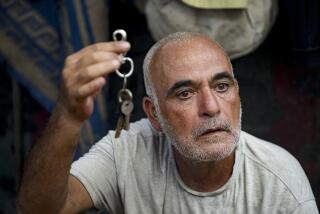Exiled Kuwaiti Princesses Describe Fleeing Palace, ‘Living in Limbo’ : Escape: After receiving a frantic phone call, members of royal family leave just ahead of the Iraqis.
- Share via
DHAHRAN, Saudi Arabia — The phone call came to the royal palace in Kuwait city just before 4:30 a.m. It was Princess Mariam Saad al Sabah’s brother-in-law. “You have to leave the palace. Go to the summer house,” he said when she reached over to her bedside table and picked up the telephone.
“He had no time to say why,” she recalls. “All I knew was, he is a calm person, and at that time his voice wasn’t calm. We left.”
Princess Mariam and her sister, Sheikha Saad al Sabah, the daughters of Kuwaiti Crown Prince Saad al Abdullah al Sabah, for the first time this past weekend told about the morning they fled for their lives from Kuwait city just before invading Iraqi troops stormed the two royal palaces.
With their cousin and her two infants, the three women huddled in a royal beach house until Iraqi troops stormed a military base right next door. Then they made a dash for the Saudi Arabian border--and a life in exile.
“My life will start again the day I go back to Kuwait. I can’t think beyond that. My country is occupied,” Princess Sheikha, clad in gold exercise pants and a T-shirt, said in an interview.
“We’re living in limbo. Right now, it’s limbo. We’re neither up nor down. I don’t even know where my husband is,” said their cousin, Barah al Sabah.
For the three women, raised in the heart of the royal family in the tiny, oil-rich emirate, the prospect of Iraqi troops massing north of Kuwait’s borders throughout the month of July was something impossible to think of as a threat. Kuwait, said Barah, had supported Iraq for years, helping to finance its eight-year war with Iran and regarding its northern neighbor as an ally.
“There is an Islamic saying,” she said: ‘My sister and I against a cousin, and my cousin and I against a foreigner. We supported him (Iraqi President Saddam Hussein) with everything.’
On the night before the Aug. 2 invasion, Sheikha had dinner with her father, the crown prince, after he had returned from failed negotiations with the Iraqis in Jidda, Saudi Arabia.
“I asked him about the meeting. I had seen the papers about the massing of troops, and I wondered if they might do something, and my father said, ‘Never. Never.”
Shortly after midnight, the crown prince got called out to a meeting at the Defense Ministry, but Sheikha, confident that all was well, went to bed.
Mariam had gone out to visit friends that night, but came back to the palace, watched a little television, and fell asleep.
When the phone call came at 4:30 a.m., Mariam pulled on the slacks she’d left hanging over a chair while Sheikha telephoned Barah and said they would be right over to pick her up.
Barah said she packed up some bottles for her two daughters, one a little over 2 years old, the other 5 months, while her husband pulled his gun out of a dresser drawer.
When the two princesses arrived, the family piled into the car with them and drove over to pick up Barah’s mother. Then all of them headed south to the royal beach house at Jelaha, directly adjacent to a Kuwaiti naval base, a place the family felt sure they’d be safe.
But the fighting had already reached the base by the time they arrived. The sound of explosions was rattling the windows of the cottage, and looking out the picture window over the Persian Gulf, the three women saw a Kuwaiti missile strike an Iraqi helicopter hovering over the water, sending the vehicle in flaming pieces down into the water.
“All we knew up to that point was the Iraqis are coming, OK. For what? For a border clash? To attack the palaces and then they can bring us back this evening?” Barah recalled. “But after seeing that helicopter, we looked at each other and we said, ‘It’s bigger than we can even imagine.’ ”
They had been at the beach house only about 15 minutes when another phone call came, ordering them to make a rush for the Saudi border. A minivan drove up near the door, and the entire family filed in--except for Barah’s husband, who stayed behind. She has not seen him since.
All the way along the two-hour drive south, the three women said, there was mostly shocked silence in the van--silence except for the tears of the children.
“It broke my heart,” Barah said, tears streaming down her face. “My oldest daughter was on my lap and holding onto me and crying, saying ‘Mommy, please don’t cry, please don’t cry’ and wiping away my tears--while she’s crying.”
The family, with no passports, no identification, waited about an hour at the border while the paperwork was completed. Then they were ushered to a hotel in Dammam, Saudi Arabia, where hundreds of Kuwaiti refugees began streaming in over the next several days. Later, they were moved to the Saudi royal family’s official refuge in the mountain resort of Taif--to wait.
“What can I say?” said Barah. “I have two little girls. The future looks--well, I believe in God, and I believe in our fate. And I also believe that we are going to go back. Without a shadow of a doubt, we’re going to go back. It’s just how, and when.”
“Of course we will get it back,” said Mariam. “I have never had the smallest thought that I would not see Kuwait again. Kuwait belongs to the Kuwaitis, forever. It will come to return to us. Of course.”
At a later news conference, the women called on the United States and the Soviet Union to put pressure on Iraq to allow the Red Cross and other international relief organizations to work in Iraq to help alleviate suffering there.
Barah urged the superpowers to “take military action now, if that’s the only way” to drive Iraq out of Kuwait.
“Economic sanctions will take a long time, and time is not in our favor,” she said. “People are starving. People are dying.” Asked about the deaths that would result from military action, she said: “If this is the price we have to pay, we are ready to pay it. We didn’t ask for this aggression. . . . If the price we have to pay is by blood, then we will pay it.”
More to Read
Sign up for Essential California
The most important California stories and recommendations in your inbox every morning.
You may occasionally receive promotional content from the Los Angeles Times.










